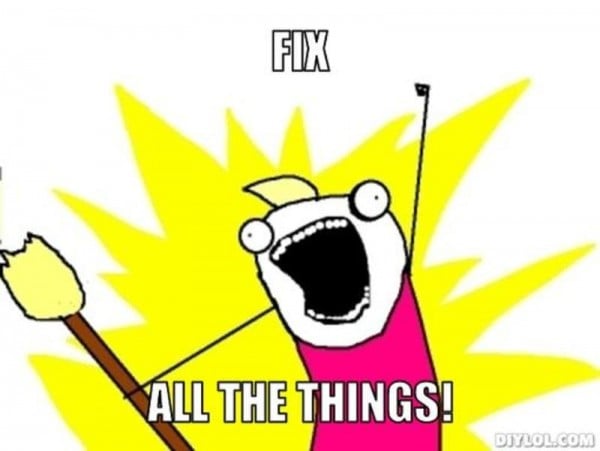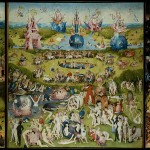“It is a fearsome thing, to fall into the hands of the living God.” (Hebrews 10:31)
Who are people more likely to call a “scold”, Pope Francis or Pope Benedict?
I don’t know the answer to that question. Perhaps someone, somewhere has the energy to study papal speeches and — possibly by comparing the number of times a pope said “Jesus Christ” to the number of times he said “capitalism” or “the poor” or “sin” or “the environment”, or “mercy” — deduce from those calculations a narrative in which one pope is determined a hectoring scold, and the other a lover of all humanity.
That person ain’t me.
However, I happened to see some people on social media who were discussing this piece by Fr. Robert Barron, and their own takes on the encyclical, Laudato Si’. Some were weary-negative of the encyclical; some were weary-positive.
What struck me most was that they all seemed in some way weary.
I’ve said before that Pope Francis is “the most exhausting pope of my lifetime”, so I think I understand why they’re tired. Some of them wish Francis was clearer in his meaning; they’re tired of trying to “figure out” his point, which often seems ambiguous.
Others are tired of trying to defend and explain him.
Others are tired (or actually, perhaps not) of blowing Gabriel’s trumpet and warning the world that hey, we have an anti-Capitalist-anti-American-anti-Christ on our hands, over here!
I don’t care about any of that — everyone can duke it out and expend vast amounts of energy as they debate the ludicrous conceits that this generation of men, women, and popes will either save the world and make everything right, or that the very same people will successfully take down a church, when better, smarter saints and fiends of the past have tried and failed on both counts.
The church survives, and outlasts everyone — all nations and institutions and all manner of clerics — by the grace of the Holy Spirit, and that will always be true.
So, I’m no longer interested in the “which pope is what” question. I’m frankly just tired of feeling scolded.
I love His Holiness Pope Francis, but for a while now, I have been feeling harangued by him, as he’s been harping on us to do more, and ever more, to practice mercy on the world; to welcome the stranger, to clean up the rivers, to bring about justice and peace in our time; to level the playing fields, visit the sick, and so on.
These are, of course, all very good things. You can’t argue with someone who is telling you to love the poor, or to make room in your pew for the transgendered, or to help poor kids get new opportunities, or to pay a worker what he is due.
But sometimes, when I read Pope Francis exhorting us again about the poor, or the environment, and urging people once again, to take action, to go out into the world and fix-all-of-the-things, because Jesus wants it (and yes, I’m sure Jesus does) I can’t help thinking, “but Holy Father, have mercy! Do you not know that many of us are already doing the best we can? Some of us are doing all we can to keep the family together, keep food on the table, and maybe go out to a movie once in a while.
Yes, we agree with you that excessive materialism is harmful to the spirit, but we’re really not “living large.” Some of us are commuting a total of four hours a day to our job, not to be rich — not to exploit poor people, or to oppress anyone, or to ignore anyone’s suffering; not to mindlessly keep up with ownership trends — but simply to pay the utility bills, and the taxes, and the student loans, and write the checks to support the charities we believe in, and support the parish, and get the car inspected and repaired, and keep the kids in a sport or activity, like Scouting, so they can learn some worthwhile skills.
We stumble in from work, eat something we can rustle up quickly, be “family” for a while — which is often a turbulent thing — and then around 10PM we plop down on the couch, looking to relax a little, turn on the news — and there you are, telling us to get up and go do something useful!
And then, we trudge up the stairs to bed, with your words ringing in our ears, and we’re feeling guilty because we have a bed to sleep in, when someone does not. We brush our teeth wondering, “But what should we do? We’re already volunteering; we bring food to the pantry every week; we volunteer in parish ministry; we celebrate birthdays and weddings by purchasing goats and donkeys and water pumps for people living in distressing poverty. We see a hungry person on the street, we buy them food, or at least give them money, as we try to get to work on time.
“We’re doing our best, Holy Father, and we’re kind of tired. Should we give our bed to someone else, and sleep on the floor? It seems impractical. How is justice served, if — because we are poorly rested from sleeping on the floor — we eventually lose our jobs, lose the ability to pay the bills, and the taxes, or keep the car, or to buy goats and water pumps, or enroll our kids in a good program that does not become an inherently bad one, simply because everyone is not in it?”
We think of Mark’s Gospel, where the penitential woman comes to Jesus, and uses expensive nard to anoint him. Judas objects, saying the luxurious oil could have been sold, and the money given to the poor.
Not a bad sentiment, of course, but neither is it a permanent solution to the problem of poverty, which Jesus himself acknowledges:
“The poor you will always have with you, and whenever you wish you can do good to them, but you will not always have me.
She has done what she could. She has anticipated anointing my body for burial.
I love that Jesus says, “she has done what she could…” those are consoling words, as much a balm to a nagged-at psyche as the nard itself. I love how he declares that the woman’s action was done purely out of love for him, to serve and honor him.
It reminds me of an important point that too often seems to get lost amid all of the Catholic in-fighting, the media noise, and the Francis’ frequent call for us to fix all the things: that if our relationship with Christ Jesus is rightly-ordered, if we truly live to love him, then we will want to serve him, wherever we find him. We’ll want to do even more.
To dare an over-simplification, “if we first seek to love Christ with our whole selves, a continual effort in right-ordering the world should logically follow.” Under the aegis of our real love, no harangues should be necessary. Let there be more encouragement, fewer scoldings.
In his encyclical Deus Caritas Est, Pope Benedict XVI wrote, “Being Christian is not the result of an ethical choice or a lofty idea, but the encounter with an event, a person, which gives life a new horizon and a decisive direction.”
He fleshed that idea out a few years later, during a catechesis on Paul’s conversion:
“. . .this was an encounter not with concepts or ideas but with the person of Jesus himself. . .Similarly, the ultimate source of our own conversion lies neither in esoteric philosophical theories nor abstract moral codes, but in Christ and his Gospel. He alone defines our identity as Christians, since in him we discover the ultimate meaning of our lives.”
By all means, let us try, as best we might, to “fix all the things.” The job will be easier, though, and most effective, if we first consent to a real encounter with the living Christ, and let him direct our minds and hearts toward his will. Then our works of mercy, our pursuits of justice, will be all the purer for love of Christ in which they originate; they’ll feel less like dutiful habits, more like a privilege with which we have been gifted.
The future before the Church is likely a heavy one, but if more Catholics will permit an authentic encounter with Christ, we will face it with grace and courage, shouting, “Long live Christ the King! Long live the Pope!”
Related:
Given what I have written here, it is extraordinarily heartening to read this: Pope offers rare ‘mea culpa’ about his neglect of middle class:
. . .a reporter asked why he had hardly ever spoken about the problems of the “working, tax-paying” middle class.
He offered a rare papal mea culpa, thanking the reporter for his “good correction.”
“You’re right. It’s an error of mine not to think about this,” he said.
“The world is polarized. The middle class becomes smaller. The polarization between the rich and poor is big. This is true. And, perhaps this has led me to not take account of this (the problems of the middle class),” he said.
Francis said he spoke about the poor often because they were so numerous but that ordinary working people had “great value.”
“I think you’re telling me about something I need to do. I need to do delve further into this ….” he said.
Bravo, Holy Father, and bless the unnamed reporter who asked the question and prompted his humble admission, that some of the sheep have been getting short shrift in his attentions, and feeling over-scolded!
Michael Novak has more on that exchange.
::Editorial Note:: This article is part of the Patheos Public Square on the Future of Catholicism in America. Read other perspectives here.













